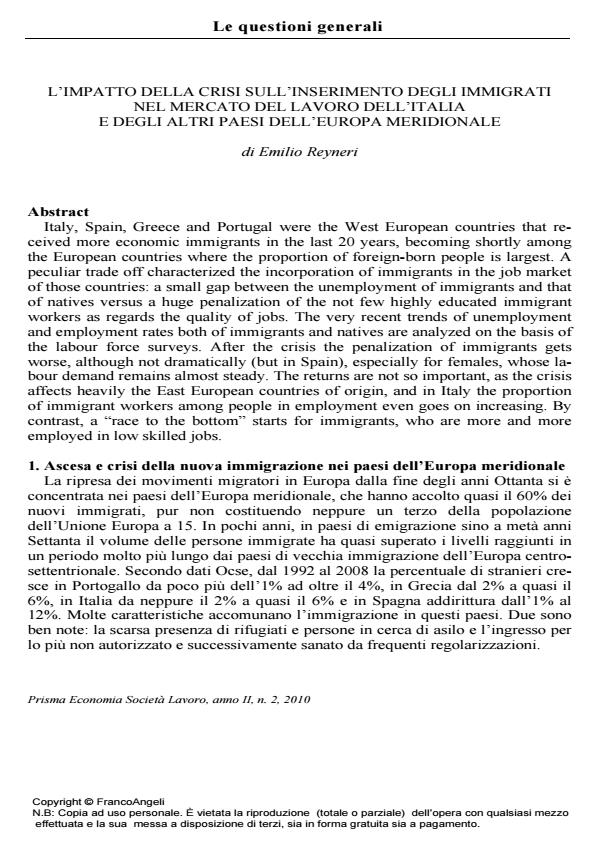L'impatto della crisi sull'inserimento degli immigrati nel mercato del lavoro dell'Italia e degli altri paesi dell'Europa meridionale
Journal title PRISMA Economia - Società - Lavoro
Author/s Emilio Reyneri
Publishing Year 2010 Issue 2010/2
Language Italian Pages 17 P. 17-33 File size 503 KB
DOI 10.3280/PRI2010-002004
DOI is like a bar code for intellectual property: to have more infomation
click here
Below, you can see the article first page
If you want to buy this article in PDF format, you can do it, following the instructions to buy download credits

FrancoAngeli is member of Publishers International Linking Association, Inc (PILA), a not-for-profit association which run the CrossRef service enabling links to and from online scholarly content.
Italy, Spain, Greece and Portugal were the West European countries that received more economic immigrants in the last 20 years, becoming shortly among the European countries where the proportion of foreign-born people is largest. A peculiar trade off characterized the incorporation of immigrants in the job market of those countries: a small gap between the unemployment of immigrants and that of natives versus a huge penalization of the not few highly educated immigrant workers as regards the quality of jobs. The very recent trends of unemployment and employment rates both of immigrants and natives are analyzed on the basis of the labour force surveys. After the crisis the penalization of immigrants gets worse, although not dramatically (but in Spain), especially for females, whose labour demand remains almost steady. The returns are not so important, as the crisis affects heavily the East European countries of origin, and in Italy the proportion of immigrant workers among people in employment even goes on increasing. By contrast, a "race to the bottom" starts for immigrants, who are more and more employed in low skilled jobs.
- "Solo di passaggio": l'Italia nelle rappresentazioni e nelle pratiche di mobilità dei giovani eritrei Milena Belloni, in MONDI MIGRANTI 2/2016 pp.249
DOI: 10.3280/MM2016-002013 - Introduzione. Gli immigrati in un mercato del lavoro in crisi: il caso italiano in prospettiva comparata Giovanna Fullin, Emilio Reyneri, in MONDI MIGRANTI 1/2013 pp.21
DOI: 10.3280/MM2013-001002 - The weak ring of the chain : Immigrants facing the economic crisis in Italy1 Carlo Brusa, Davide Papotti, in Belgeo /2011 pp.149
DOI: 10.4000/belgeo.7099 - Refugees as Gamblers: Eritreans Seeking to Migrate Through Italy Milena Belloni, in Journal of Immigrant & Refugee Studies /2016 pp.104
DOI: 10.1080/15562948.2015.1060375 - Crisi economica e migranti: il ritorno del lavoratore povero Devi Sacchetto, Francesca Alice Vianello, in MONDI MIGRANTI 1/2013 pp.79
DOI: 10.3280/MM2013-001005 - Effetti della crisi occupazionale sui migranti nel nord-est italiano: marocchini e rumeni tra ritorni e stabilizzazione Marco Semenzin, in MONDI MIGRANTI 1/2013 pp.101
DOI: 10.3280/MM2013-001006 - Ricongiungere la famiglia in tempo di crisi. Strategie per ricostruire e difendere l'unità familiare a inizio millennio Francesco Della Puppa, Ottavia Salvador, in MONDI MIGRANTI 2/2015 pp.169
DOI: 10.3280/MM2015-002007 - Condizione occupazionale e dinamiche familiari delle donne immigrate in Italia Gabriele Ballarino, Nazareno Panichella, in Quaderni di Sociologia /2015 pp.83
DOI: 10.4000/qds.345 - Gender, Family, and Adaptation of Migrants in Europe Francesca Alice Vianello, pp.117 (ISBN:978-3-319-76656-0)
- Unemployed Migrants Coping with the Economic Crisis. Romanians and Moroccans in Italy Devi Sacchetto, Francesca Alice Vianello, in Journal of International Migration and Integration /2016 pp.839
DOI: 10.1007/s12134-015-0440-2 - Migrant women’s employment in paid reproductive work through the crisis: the case of Italy (2007-2012) Anna Di Bartolomeo, Sabrina Marchetti, in Investigaciones Feministas /2016 pp.57
DOI: 10.5209/rev_INFE.2016.v7.n1.52197 - Immigrazione, occupazione e crisi economica in Italia Maurizio Ambrosini, Nazareno Panichella, in Quaderni di Sociologia /2016 pp.115
DOI: 10.4000/qds.1578 - Gendering health differences between nonmigrants and migrants by duration of stay in Italy Eleonora Trappolini, Cristina Giudici, in Demographic Research 7/2021 pp.221
DOI: 10.4054/DemRes.2021.45.7 - Going "beyond the mean" in analysing immigrant health disparities Gabriella Berloffa, Francesca Paolini, in Demographic Research 7/2022 pp.161
DOI: 10.4054/DemRes.2022.47.7 - The Impact of the Economic Crisis on Foreigners in the Italian Labour Market Corrado Bonifazi, Cristiano Marini, in Journal of Ethnic and Migration Studies /2014 pp.493
DOI: 10.1080/1369183X.2013.829710
Emilio Reyneri, L'impatto della crisi sull'inserimento degli immigrati nel mercato del lavoro dell'Italia e degli altri paesi dell'Europa meridionale in "PRISMA Economia - Società - Lavoro" 2/2010, pp 17-33, DOI: 10.3280/PRI2010-002004